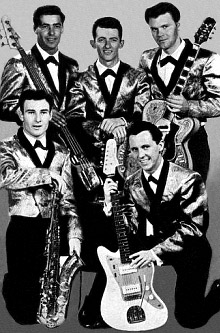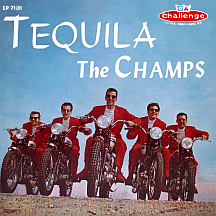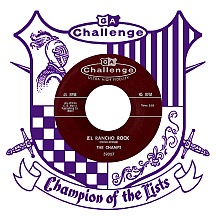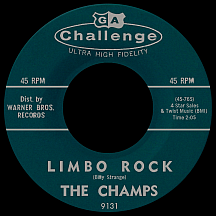THE CHAMPS
Out of the '50s it came, another of the many instrumental recordings to reach number one, though this particular tune was different; it was a rock and roll instro, the first of its kind to top the national charts. An unnamed studio group did the deed; "Tequila" has a slight south-of-the-border flavor but wasn't based on any preexisting Latin or regional Mexican melody. When Gene Autry and his business partners decided to release the song on their record label, Challenge, a name for the group had to be chosen. The Champs was taken from Champion (the horse Autry had ridden onscreen in the many western movies he'd starred in since 1934, when he filmed the first western/sci-fi/musical movie serial, The Phantom Empire). Expectations for the track were nil; it was just tacked onto the B side of "Train to Nowhere," which they considered hit-worthy (and it is really good!). Yet the gimmickry of inserting the word 'tequila' in three different spots, spoken by sax man Danny Flores twice and at the end with the whole band (and say, does that mean it's technically not an instrumental?), caught the attention of listeners when deejays began flipping the disc over ("It was an accident!," the first guy claimed when called on the carpet for it). Yeah, an accident that yielded one of pop culture's most famous hits!
Autry had started the Los Angeles-based label in early 1957 with Joe Johnson and Johnny Thompson, his partners in the music publishing company Golden West Melodies. Challenge struggled at first and Gene sold his shares to the others less than two years later (though his initials "GA" graced the printed labels for many years to come). But he was there long enough to be involved in the label's chart-topping breakthrough. Dave Burgess, who at 18 had a radio show, playing guitar live on the air on KAVL-AM 1340 in his hometown, Lancaster, California, had been making records for small labels including the Cole Porter song "I Love Paris" by The Dave Burgess Trio in '55 and several cover versions for budget labels over the next couple of years.
At age 20, Burgess joined Challenge as a songwriter and vocalist; three of the label's first five 1957 releases were his, under the pseudonym Dave Dupré. In the fall, he wrote and recorded a clever ditty, "I'm Available," using his own name; a cover by Margie Rayburn on Liberty became a top ten hit. It was one of two hits he had that year as a songwriter, the other a top 20-selling country single by Ray Price, "I'll Be There (When You Get Lonely)" (first recorded for Challenge by rhythm and blues group The Commodores). Licensed through Golden West Melodies, these hits kept Challenge going while ensuring Dave's continued employment with the company.
In early 1958, Challenge Records finally scored a national hit with "So Tough" by a four-man, one-woman R&B act, The Kuf-Linx (it was a cover of a song by Dallas, Texas group The Casuals). Burgess backed the Kuf-Linx on guitar with several other session musicians. Afterwards, Dave and various L.A. musicians began working together, trying out different riffs in efforts to create radio-friendly instrumentals. In one session he came up with "Train to Nowhere," laying down the track with four others: guitarist Buddy Brice, bassist Cliff Hills, drummer Gene Alden and saxophonist Flores, who'd written "Tequila," one of a few additional songs completed that night. 28-year-old Flores had played sax in various L.A. area clubs for several years and fronted The Danny Flores Trio with Brice and Alden (and had even performed briefly with Burgess as Danny and Dave); he was signed at the time to RPM Records (solo and as a credited backing musician for Bill Tracy).
The "tequila" riff was something Flores had come up with as a transition between songs during his live shows. At the Goldstar Studios session, engineer Stan Ross suggested they build the arrangement by bringing in each instrument, starting with the acoustic guitar, overlaying it with bass, then electric guitar, drums and finally the sax leading the full band. The five musicians received a session fee and then forgot about it, seeing little or no potential in the tracks they had done. But Johnson and Thompson liked what they'd heard, particularly "Train to Nowhere" after sound effects and 'oooooh-wah-wah' vocals had been added. After settling on the Champs as the band's name, they changed Flores's writing credit to Chuck Rio to avoid any problems with his RPM contract (though eventually Modern/RPM caught on and claimed a share of the songwriters' royalties). Danny had a new stage name whether he liked it or not.
"Train to Nowhere" made L.A's KFWB/Channel 98 playlist in January, just a few weeks after the studio session; a few other stations picked it up, but it didn't last long. A cover version of "Tequila" was recorded for ABC-Paramount by former strip club sax man Eddie Platt (birth name: Edward Platakis); the spoken "tequila" part eschewed the spanish accent for a more drunk-sounding delivery. Momentum was briefly in Platt's favor, but the Champs' version dominated, rising quickly to number one on the Billboard and Cash Box charts, where it stayed for five weeks in March and April (and also topped the R&B chart) while Platt settled for a respectable top 40 showing. The Champs' original was so big that the title was used in another number one hit just a few weeks later. Sheb Wooley's "The Purple People Eater" climaxed with the high-pitched voice of the 'one-eyed, one-horned' creature: 'Ta-keee-la!'
With no official group as of yet, Burgess and the Flores Trio became the Champs. Dave, who'd never performed in public, had to work on developing his stage presence. Lead guitarist Brice continued recording in the studio but decided against doing any touring, so Dale Norris replaced him on the road. Hills quit and was replaced by Joe Burnas, who then stepped aside for bassist Van Norman. As the act improved, there was a lot more touring; they opened for Gene Vincent and his Blue Caps, then headlined with support from Challenge's other marquee act, the Kuf-Linx. The band's studio output consisted of instrumentals written by Burgess; "El Rancho Rock" (based on "El Rancho Grande," a Mexican song from the '20s that had been a hit for Autry in 1940) made it to the top 30 in June; flip side "Midnighter," a non-Latin-style rocker, hit the chart in August, just as the third single, "Chariot Rock" (energizing the "Swing Low..." gospel classic), began a lengthier mid-chart run.
Tiring easily of the nonstop road tours, Flores and Alden quit; they later did a Latin/Champs-style recording ("Margarita") as Chuck Rio and the Originals while Flores made a few as Chuck "Tequila" Rio. Their replacements, both from small Texas towns, were saxophonist Jimmy Seals and drummer Dash Crofts, who'd backed rocker Dean Beard during his '57 and '58 stints with Atlantic Records and Challenge; Beard also played piano in a short-lived six-man Champs lineup. The singles "Rockin' Mary" and "Beatnik" failed to catch on during this time. Norman died in a car crash in November '58 and was replaced by Bob Morris. Then "Tequila" pulled off a surprise win in the category Best Rhythm and Blues Recording (against mainly jazz and pop competitors) at the first Grammy Awards, presented on May 4, 1959. In keeping with the precedent set by their breakthrough smash, Latin-influenced originals composed by Burgess frequently appeared as A sides..."Caramba"!

As the new decade rolled in, the group made a return to the top ten on many stations around the country with a slowed-down sequel to their famous hit: "Too Much Tequila" was a bit more obvious as a mildly condescending Mexican drinking tune, but the novelty caught on and returned them to the national top 30 at the end of February 1960. Later that year Burgess tried something different, doing the vocal on a song he'd composed; "Alley Cat" bombed and he began to rethink his role in the Champs. He'd been heading the Artists and Repertoire department for some time and decided to stop performing as a member of the group in order to devote more time to developing the label's acts. Securing ownership of the band's name, he continued producing, writing songs for them and overseeing their recording sessions. But he no longer played or toured with them. The guy who took his place was a talented young guitarist from Arkansas named Glen Campbell.
The musical output wasn't any different from before; songs with predictable titles ("Jumping Bean," "Sombrero," "Cantina") were the norm during Campbell's time with the band. He stayed with the group for about a year before completely devoting himself to his solo singing career, which took awhile before taking hold. Over the next few years he became a prolific session musician in Los Angeles, enhancing many recordings with his guitar expertise as an unofficial member of the famous but much-later-named "Wrecking Crew." In early 1962, while the "Twist" craze was hitting its peak as the most popular of all rock and roll era dances, the Champs scored their fourth top 40 hit. "Limbo Rock" (penned by another great L.A. guitarist, Billy Strange) retained the group's signature Latin flavor while launching a new craze that wasn't a dance, per se, but a party game: "Limbo Rock" first came to life as an instrumental, nearly a year before Chubby Checker turned it into a bona fide phenomenon with his massive hit vocal version.
The next disc took the Champs into new territory; "Limbo Dance" featured vocals by studio singers ('clap your hands, stomp your feet...') in an attempt to turn the 'how low can you go' under-the-stick challenge into a series of dance moves. Ten more single releases came in its wake, including regional hits "Mr. Cool" (based on the "Mr. Clean" TV commercial jingle) in early '63 and "Only the Young," an easy surf-style groove from the spring of '64 that was a top 20 hit in their L.A. home base, but a no-show on the national charts. Burgess remained at the helm until he retired the band and its name at the beginning of 1966...well, almost. Seals and Crofts stayed until that time, reemerging in the 1970s as a popular vocal duo with many hits ("Summer Breeze," "Diamond Girl" and "Get Closer" all reached the top ten). While Jimmy and Dash enjoyed their successful run, Burgess returned with The Muscle Shoals Horns for a one-shot single by The Champs: "Tequila '76," funk-style.
The career of Dave Burgess has seemed like a never-ending one. He's written and produced music for artists large and lesser-known, managed country superstar Hank Williams, Jr. for some four decades and has released his own material in a career lasting more than 60 years. If, by chance, his greatest hit ever seemed fated to fade into obscurity, children's show host Paul Reubens stepped in to catapult it back into lasting pop culture status. Pee-wee Herman's "Tequila dance" (using the original hit version in the 1985 comedy film Pee-wee's Big Adventure...shout-out to Large Marge!) caused a sensation...and the song is still going strong, its familiarity all-encompassing.
NOTABLE SINGLES:
- Train to Nowhere /
Tequila - 1958 - El Rancho Rock /
Midnighter - 1958 - Chariot Rock - 1958
- Rockin' Mary /
Turnpike - 1958 - Beatnik /
Gone Train - 1959 - Caramba - 1959
- Double Eagle Rock - 1959
- Too Much Tequila - 1960
- The Little Matador - 1960
- Alley Cat - 1960
vocal by Dave Burgess - Jumping Bean - 1961
- Sombrero - 1961
- Cantina - 1961
- Limbo Rock /
Tequila Twist - 1962 - Limbo Dance - 1962
- Mr. Cool - 1963
- Jalisco - 1963
- Only the Young - 1964
- Buckaroo - 1965
- Tequila '76 - 1976




